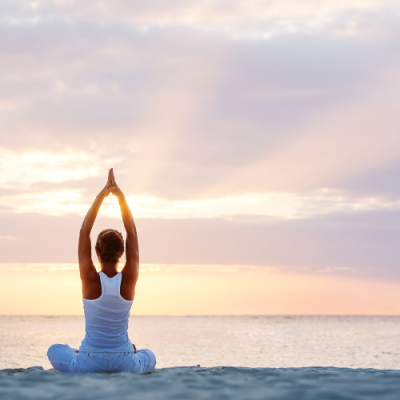Yoga Therapy for Anxiety & Stress

Yoga Therapy for Anxiety & Stress
December 14, 2023
Yoga therapy: Anxiety and stress therapy
The mind is always busy with one or other thoughts which may be necessary or unnecessary. Becoming a master of the mind is not easy. Mind, more specifically thoughts affect perception and behavior altogether. To control one thought either we can interrupt and replace them or vanish them out of the mind. Mind and body are interrelated and interdependent. Nowadays the stress and anxieties are common problems which affect the mind and further affect the body. A person’s problem with anxiety ranges from mild to severe. Anxiety is common in all age groups.
What causes anxiety disorder: –
• Work stress
• Stress in personal relationship like marriage
• Financial problems
• Tension due to some serious illness
• Side effects of long term medication
Yoga helps to cure.
Yoga is a natural way which is helpful to overcome the deep-rooted worries and fear. It is a mind-body conection. Yoga includes asanas[postures],pranayama[breath work], relaxation techniques, and meditation used to counter the stress and anxiety issues and is cost-effective and easy to implement.
Asanas[postures]
- Tree pose [vrikshasana]
- Mountain pose [tadasana]
- Thunder bolt pose [vajrasana]
- Child pose [Shashaank asana]
- Corpse pose [shavaasana]
Pranayama [breathing techniques]
- Nadi shodana (for balancing right and left side brain]
- Anulom vilom(alternative nostril breathing with retention)
- Ujjayi breathing (for increasing the lung capacity)
- Bastrika and Kapala Bathi (forceful exhalation)
Relaxation techniques
Deep relaxation and yoga Nidra are very beneficial for anxiety disorders. Yoga Nidra is qualitatively different from relaxation. It is a state of sleep where you release all the burdens and tensions from the body and mind. It is much more intense than ordinary sleep.
During anxiety and depression, there is a decrease in neurotransmitters such as serotonin and norepinephrine. Besides, an increase in level of cortisol has a role in causing depression by regulating the functions of serotonin and norepinephine. yoga helps in decreasing the cortisol level leading to a counter regulatory effect to reduce the symptoms.
Meditation
Meditation can be done for improving concentration and to stabilize the mind. It has been proven to be a very good solution for stress management. This practice is a promising new treatment for stress related disorders. Meditation indicates a potential role in reducing maladaptive and compulsive behaviour. These techniques alter the theta and alpha EEG patterns significally more than regular relaxation
Yoga is important in day-to-day life, not only for the people who have anxiety disorder, but also to improve overall health and quality of life. Regular practice of yoga helps to achieve peacefulness of body and mind.